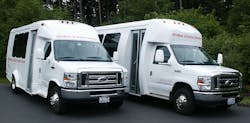Island shuttle company implements propane autogas
Aug. 25, 2017
Related To:
Voice Your Opinion!
Voice Your Opinion!
Whidbey-SeaTac Shuttle & Charter has converted three 24 passenger Ford E-450 buses to propane autogas with plans to convert 11 more vehicles in the future. The local Washington company provides rides from Whidbey Island, approximately two hours North of Seattle, to SeaTac Airport. Offering rides nearly 24 hours per day, each shuttle bus drives approximately 50,000 miles per year and is rotated out of the fleet at 350,000 total miles. Whidbey-SeaTac worked with Blue Star Gas to convert three vehicles to the Prins propane bi-fuel system, which allows the buses to operate on propane autogas, but retains the ability to switch to gasoline if necessary.
“Diesel has always been more expensive than gasoline in our area, so we started out with all of our vehicles on gasoline,” said John Solin, co-owner of Whidbey-SeaTac Shuttle & Charter. “After Blue Star Gas gave their presentation about propane, the only question was, ‘Tell me why a company should not convert?’” John and his business partner were excited about the opportunity that propane autogas presented for their company, but wanted to do their own research. “Once we did the research, we found that it just made sense for us. From a financial perspective, our vehicles traveled enough miles that we would likely see ROI within one year. We’re also located in an area of the country where using alternative fuels is important. So, we evaluated our fleet and decided to convert our three newest vehicles to propane autogas so we could get the most value out of them on propane.”
Aside from the financial and emissions angle, a lingering question for Solin was performance. “At first, we were somewhat skeptical we would not get the same performance from propane because our routes do have some steep hill climbs,” said Solin. “Not only did propane deliver on the performance, but we can run our entire roundtrip route completely on propane without switching to gasoline.” The buses refuel at a Blue Star Gas location near the SeaTac Airport, which Solin said is closer and more convenient than their traditional fueling stations. In addition to fuel and conversion support, Blue Star Gas also provided training to Whidbey-SeaTac drivers and staff. “Whidbey-SeaTac is another great example of very smart businessmen evaluating propane autogas and seeing an opportunity,” said Darren Engle, Director of Government Relations for Blue Star Gas. “Anyone who does the math quickly realizes the value of converting their fleet to a bi-fuel propane autogas system. The costs savings, combined with emissions reduction and potential government incentives make it a very enticing proposition.” Solin plans to keep converting vehicles to propane as he transitions new buses into the fleet.
